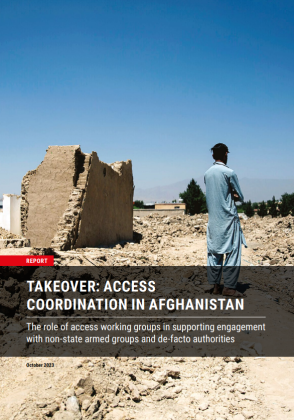Takeover: Access coordination in Afghanistan
The access working group in Afghanistan has played an important role in supporting engagement with the country’s new authorities amidst a tightening of humanitarian space. The changed access landscape in Afghanistan, brought about by the Taliban’s takeover of the country, has presented a fresh set of challenges for coordinated access engagement that the humanitarian community is still coming to terms with.
This report is one of three case studies exploring how access working groups support engagement with non-state armed groups and de-facto authorities and the factors that both enable and constrain that engagement. The findings are based on in-country interviews with humanitarian access specialists, senior humanitarian officials, and donors.
The report finds that:
- While physical access in most parts of country had improved, the humanitarian community is facing significant challenges in negotiating a principled space to operate. Some participants worried the access environment could become so constrained that principled humanitarian action would become impossible.
- The access working group was seen in late 2022 to be playing a positive role but progress it had made appeared vulnerable to staff turnover and its ability to creates a sustainable and functional relationship with the humanitarian country team.
- Engaging with the authorities in Afghanistan was heavily influenced by sanctions and counter-terrorism measures, donor governments' political stances, and the structure and different power bases of the authorities.
Click here to download the case study report
